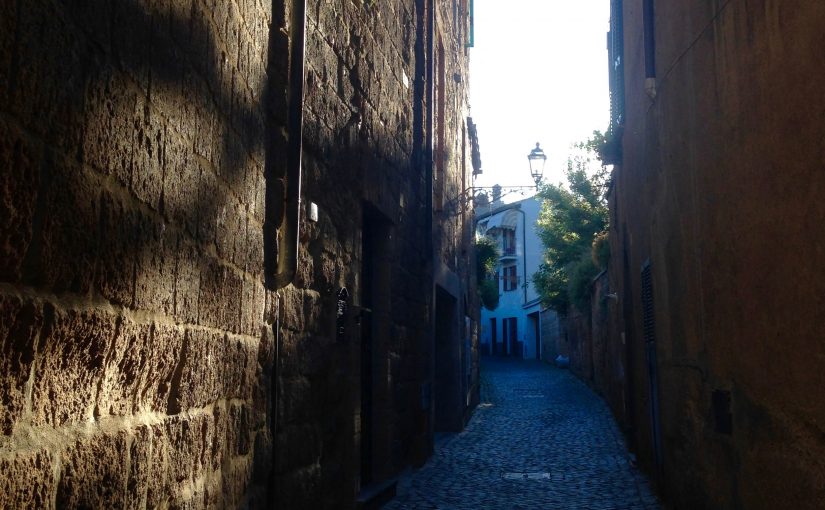Orvieto endured occupation by Nazi forces for nearly nine months, and that was followed by months more of chaos, uncertainty, and civil strife. I can’t honestly bring myself to complain about twenty days without pizza. I may think about complaining, but really, for both the common and personal good, I will endure, too.
Spooked by various interpretations I’ve heard as to what walks are allowed, I decided to count the steps back and forth in my little courtyard as a possible surrogate, at least for daylight treks. As you may recall, I paced out the route of my late night walk a few days ago, so I had a gauge that only needed use of the multiplication tables to produce a total: 2,600 steps. The courtyard paced off at 10-12 steps, so I settled for 250 repetitions as a midday walk equivalent.
At first, I went from door to gate. I did that fifty times. Then I looked at the umbrella (still down in winter mode) and the plastic wicker, and drawing inspiration from Roman sports architecture, quickly built Circus Minimus, an oval route around a long spine. That was much better, more fluid, so a hundred circuits finished the walk. It was a little like doing laps in a 30-foot pool, you never get up to speed, but in the end I felt exercised.
Halfway through this routine, Renzo came onto his balcony.
“I’m sending down the basket.”
“Why? More baked goods?”
“Yep. Hold on.”
He disappeared into his house. I continued my circuits, picking up speed. Imagining myself a charioteer, I heard the thunderous the roar of the crowds. As I was rounding number sixty-something, the tiny basket dropped down.
“Another crostata, and marmalade-filled cookies.”
“Oooh! Perfect!”
“For lunch!”
“Excellent timing, I just had lunch before I came out.”
“Now you have dessert,” and he hoisted the basket aloft. Okay, for elegance sake I left out that he dropped the ball of twine, and after some confusion, I placed it in the basket so basket and twine could ascend together.
“Thank you my friend!” I took the gifts inside and sampled one of the cookies. The pastry was melt-in-your-mouth delicious, and the filling soft and fruity.
On repetition seventy-something, Renzo came out again.
“Did you try one?”
“Mamma mia, so good!”
He nodded and smiled, chuckled a bit. “There will be more.” What have I done to deserve such kindness?
A story on a darker side of sugar has been playing through my head these days. You’ll understand why when I tell you.
Forty-some years ago, a friend recorded an interview with his father who had survived several Nazi concentration camps. What he shared was remarkable, and I will never forget it. At the end of the interview he told about the liberation.
The last camp he was in was run by a regular army officer. The war was coming to an end, and SS rarely visited anymore, so the commandant made every effort to assure that the prisoners under his charge made it through, alive and safe. Each night, the prisoners and their guards stood at the fence and watched the fire of the Allied advance. When it became clear that liberation was only a day or two away, the commandant sent a trusted second-in-command towards the lines with news of what lay ahead, and to implore the Allies to move quickly. Also, to tell them to be prepared to take hundreds of prisoners to safety. Then against orders, which were to burn the prisoners alive, they marched towards the Americans to surrender. Everything progressed accordingly. The Allies took charge of the men and sheltered them in a warehouse while they sought ways to provision them.
“Then came the great tragedy,” my friend’s father said. The Americans didn’t know it, but in storerooms off the main part of the warehouse were closets filled with sweets; chocolate bars, soft drinks, candy. The men housed there had not tasted sugar for months, some for years. The closets were discovered, the sweets eaten, and that night more than half the men died of insulin shock.
It’s not over until it’s over.
